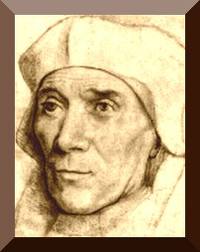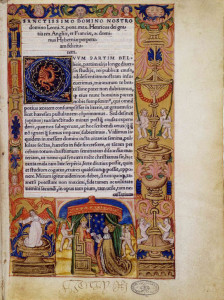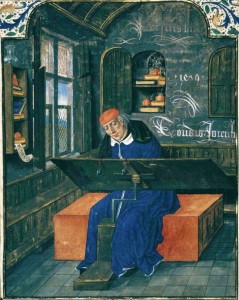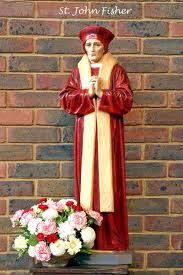
Summar: John Fisher, a quiet, scholarly man, who, as Bishop of Rochester refused to recognise Henry VIII as Head of the Church in England. He was imprisoned and found guilty of treason. He was beheaded on 22nd June 1535.
Henry Peel OP tells his story.
 On June 7th, 1535, John Fisher was found guilty of treason on the grounds that he had said these words: ‘The King, our Sovereign Lord, is not Supreme Head in earth of the Church of England,” On June 22nd of that same year he was beheaded on Tower Hill in London.
On June 7th, 1535, John Fisher was found guilty of treason on the grounds that he had said these words: ‘The King, our Sovereign Lord, is not Supreme Head in earth of the Church of England,” On June 22nd of that same year he was beheaded on Tower Hill in London.
Before he died he proclaimed to the crowd who had gathered to watch the execution: “Christian people, I am come hither to die for the Faith of Christ’s Holy Catholic Church.” While in prison awaiting trial John Fisher had been created a Cardinal of the Holy Roman Catholic Church. He was the first member of the College of Cardinals to suffer martyrdom.
In 1935 he was canonised as a Saint in St Peter’s Basilica in Rome. His Feast Day is kept on June 22nd together with that of his companion martyr, St Thomas More. More was a layman who had been Lord Chancellor of England. Thus the chief law officer of the Crown and the highest dignitary of ecclesiastical rank in England, died in defence of the principle that the Pope is the Supreme Head in earth of the Church of England.
Henry VIII Defender of the Faith

Pope Leo X was so impressed with Henry’s endeavors to preserve Catholic beliefs that he conferred him the title of ‘Fidei defensor’ or ‘Defender of the faith .
Only ten years before his execution John Fisher and King Henry VIII had jointly defended the old Faith against the attack of Martin Luther. The King had written A defence of the seven sacraments against Luther’s new ideas. John Fisher had written A defence of the assertions of the King of England against Luther’s Babylonian Captivity. The latter work was published at Cologne in 1525. The King’s book had appeared in the late summer of 1520. In September 1520 King Henry’s book, which contained a strong defence of the Pope as the divinely appointed Head of the Church was presented to Pope Leo X. In recognition of the King’s defence of the Catholic Faith the Pope conferred on him the title of Defender of the Faith. The Papal Bull conferring this title granted it also to his successors as a permanent memorial of his orthodox faith and of his zealous skill in its defence. This papal title is still included in the official title of English monarchs.
Scholarly Man
John Fisher was a quiet, scholarly man. He was born in Yorkshire in 1469. His father was a wool merchant and he sent his son to Cambridge. John Fisher graduated as a Bachelor in 1488. In 1491 he took his Mastership and became a Fellow of Michael House. In 1501 he became a Doctor of Divinity and Vice Chancellor. In 1504 he was Chancellor of the University. This progress shows his scholarly interests. Even more significant was his choice of the famous humanist, Erasmus, to lecture at the University. He was a friend of More and of those who aimed at a reform of education especially for the clergy. Indicative also of his character and of his interest is that at the age of forty seven he took up the serious study of Greek and began to study Hebrew. In 1504 he was appointed Bishop of Rochester.
The diocese of Rochester was the poorest of the English dioceses. Its bishop had no interest in promotion to any higher dignity. When such promotion was offered him he said: “I would rather keep my poor wife than marry the richest widow of England.” He devoted the same care to his diocese as he had devoted to the promotion of education. In appearance he was a tall, handsome man, of slim build and dark, greying hair.
The events which led to his death was the king’s decision to repudiate his wife, Catherine of Aragon, and to claim Headship of the Church of England when the Pope refused to sanction the King’s decision. On 16 April, 1534 he was lodged in the Tower of London together with Thomas More. Both had refused to take the oath of Succession acknowledging the issue of Henry VIII and Anne Boleyn as legitimate heirs to the Throne. “Not that I condemn any other men’s conscience,” he wrote, “their conscience may save them and mine must save me.” Fisher’s trial took place in Westminster Hall on June 17th 1535. He was found guilty of high treason for denying that the King was Supreme Head of the Church of England.
 John Fisher Dies on Scaffold
John Fisher Dies on Scaffold
On the morning of June 22nd, 1535, John Fisher was roused from sleep before five o’clock. The Lieutenant of the Tower told him that he was to die that day. “Well”, he said, “if this be your errand you bring me no great news, for I have long looked for this message. And I must humbly thank the King’s Majesty that it pleaseth him to rid me from all this worldly business. And I thank you also for your tidings.” He then asked what time it was and being told that it was about five he said: “Well then let me by your patience sleep an hour or two. For I have slept very little this night. And yet to tell the truth, not for any fear of death, thank God, but by reason of my great infirmity and weakness.”
When he awoke after a brief sleep, John Fisher began his final preparation. He asked that his best clothes, such as they were, should be laid out for him, remarking: “This is our marriage day and it behooveth us to use more cleanliness for the solemnity thereof.” He was very weak and had to be carried in a chair to the Tower Gate for the formality of handing him over to the Sheriff of London. He was escorted by soldiers with arms at the ready. There was a pause at the Tower gate. Fisher opened his New Testament and his eyes fell on the passage of the Gospel according to St John; “This is eternal life to know Thee, the only true God and Him whom Thou hast sent, Jesus Christ. I have glorified Thee on earth. I have finished the work Thou gavest me to do. And now glorify Thou me, Father, with Thyself, with the glory which I had with Thee, before the world was made.” He then said: “There is enough learning in that to last me to the end of my life.” His scholarship had reached its fulfilment.
 At the scaffold Fisher declined an offer to help him mount the steps saying: “No, masters, since I came so far ye shall see me shift for myself well enough.” From the scaffold he said that he was about to die for the faith – that hitherto by God’s grace he had not been afraid – but that he asked their prayers lest at the very stroke of death he might not stand steadfast. He invoked a blessing on England, that God would hold His holy hand over it. And he prayed for the King that God would send him good counsel. He recited the Te Deum, forgave his enemies and laid his head of the block. At one blow of the axe it was severed from his body.
At the scaffold Fisher declined an offer to help him mount the steps saying: “No, masters, since I came so far ye shall see me shift for myself well enough.” From the scaffold he said that he was about to die for the faith – that hitherto by God’s grace he had not been afraid – but that he asked their prayers lest at the very stroke of death he might not stand steadfast. He invoked a blessing on England, that God would hold His holy hand over it. And he prayed for the King that God would send him good counsel. He recited the Te Deum, forgave his enemies and laid his head of the block. At one blow of the axe it was severed from his body.
His friend Thomas More, who was to follow him to the scaffold within a few days, wrote of him: “I reckon in this realm no one man, in wisdom, learning and long approved virtue together, meet to be matched and compared with him.”
This article first appeared in The St Martin Magazine (June 2001), a publication of the Irish Dominicans.